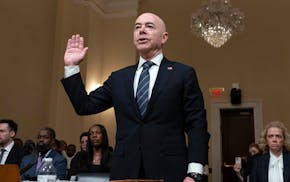WASHINGTON - Five years after Paul Wellstone's death, the U.S. House is poised to pass a mental health and addiction bill named for the late Minnesota senator who championed the cause in the last years of his life.
But today's vote, which is being termed "historic" by Wellstone's family, will not be the last word on the matter. The long-sought legislation, which would require insurers to cover mental health in the same way as physical ailments, still faces stiff opposition from industry groups, who prevailed upon the Senate to pass a less stringent version last year.
Competing bills
Now, as the competing bills head for House-Senate negotiations, the two sides are ramping up their lobbying, with the Wellstone forces summoning former First Lady Rosalynn Carter and House Speaker Nancy Pelosi for a pre-vote rally outside the Capitol.
"For five years, I have heard promise after promise that Congress will pass mental health parity legislation in my father's honor," David Wellstone wrote in a message to supporters this week. "Now, this is it."
With a majority of the House having signed on as co-sponsors, there is little doubt that this vote may be it -- as far as the House is concerned. For some, including retiring Minnesota Republican Jim Ramstad, an overwhelming show of support in the House could be enough to win critical leverage in the bargaining with the Senate.
Ramstad, who worked with Sen. Wellstone to advance the legislation, has signaled that he is open to compromise. But it is unclear how far he can go without giving in to industry groups who say the House bill would mandate expensive new treatments and drive up costs for everybody.
"The American people should not have to wait any longer to receive the same access to treatment that members of Congress have," said Ramstad, a recovering alcoholic who has made addiction and mental health treatment a central part of his political legacy.
The Senate version gives insurers much greater latitude than the House bill in determining what mental conditions are covered. Sen. Wellstone's sons, Wellstone Action co-founders David and Mark Wellstone, fear that the Senate bill would leave many people without coverage.
Wellstone Action supporters peppered House offices Tuesday with e-mails urging passage of the bill, saying that the legislation is a "critical part" of the legacy of Paul Wellstone, who died in a 2002 plane crash.
On the other side, employer groups such as the U.S. Chamber of Commerce appealed to House members to adopt the Senate version, which they say represents a compromise among the business, insurance and mental health communities.
Bruce Josten, the chamber's executive vice president for government affairs, said the House version would "constrain employers' flexibility in plan offerings, and ultimately, cause employers to cut or curtail voluntary benefit offerings."
In a sign of the business stakes involved, Josten noted that House members' votes may be counted in the chamber's annual ratings scorecard.
Minnesota senators in sync
Although the Senate passed its version of the bill unanimously, senators from Minnesota and elsewhere also have expressed support for the House version, named the Paul Wellstone Mental Health and Addiction Equity Act.
"With passage of this bill in the House, we are one step closer to ending the discrimination against those who suffer from debilitating mental health disorders," said Sen. Norm Coleman, R-Minn.
Sen. Amy Klobuchar, D-Minn., said that she supported the Senate version to keep the legislation moving but that she prefers the House bill. "We had to get a bill through the Senate," she said, noting that many senators viewed it as an improvement over current law.
Critics of the House bill include Minnesota's John Kline, the ranking Republican on the House subcommittee that deals with health legislation. Kline, who has accused Ramstad of "overreaching" with the Wellstone legislation, tried unsuccessfully to have the House take up the Senate version of the bill.
Divisions over the competing bills also have sparked what one Capitol Hill newspaper called the "Tale of Two Kennedys," with Sen. Edward Kennedy, D-Mass., sponsoring the Senate version in opposition to his son, Rep. Patrick Kennedy, D-R.I., chief sponsor of the House version.
No matter which version Congress ultimately passes, Wellstone's followers are expected to cheer today's House vote as a high-water mark in a decade-long quest. "It's everything that we wanted," said Wellstone Action spokeswoman Elana Wolowitz. "We feel good about having Senator Wellstone's name on it."
Kevin Diaz • 202-408-2753
New Black congressional district in Louisiana bows to politics, not race, backers say
Trump trial jury selection process follows a familiar pattern with an unpredictable outcome
Climate change concerns grow, but few think Biden's climate law will help, AP-NORC poll finds
